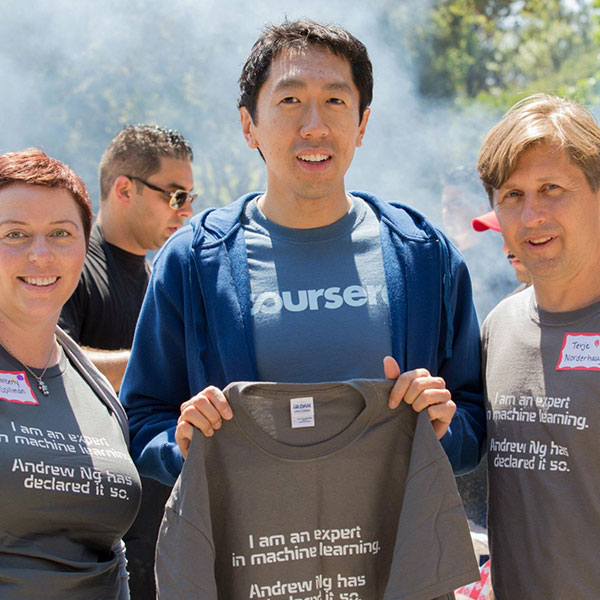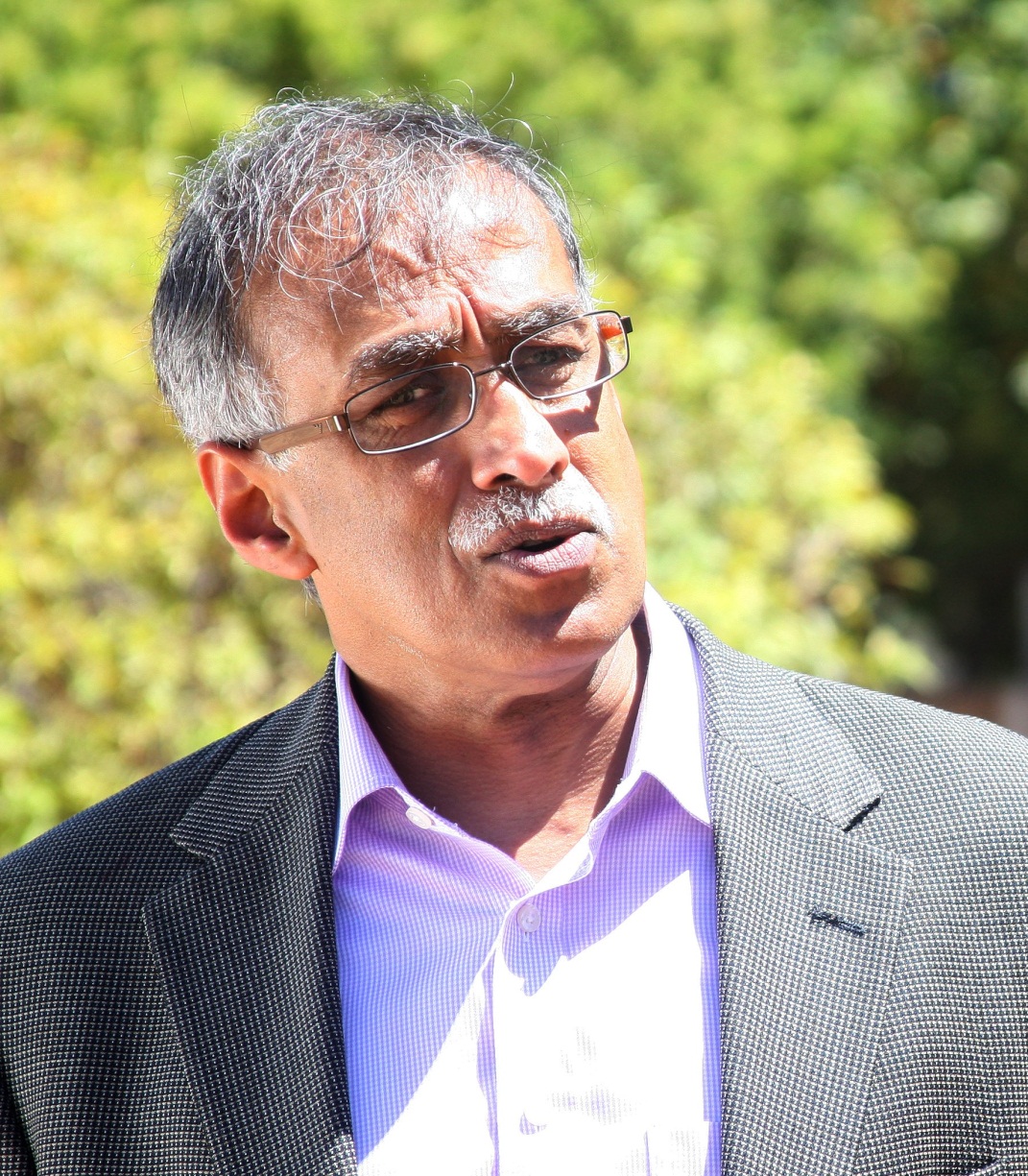Progress Maker: Claire Fallender Director of Ashoka’s Global Venture and Fellowship
Progress Maker Profile
Written by The Economist Intelligence Unit
 Claire Fallender
Claire Fallender
Director of Ashoka’s Global Venture and Fellowship
Challenge: How to harness entrepreneurship to solve the world’s most pressing problems.
Related content

Steering through collaboration: CFOs driving new priorities for the future
It is well established that the modern CFO has a more strategic role to play in a business, but a clear action plan to achieve this is lacking. A key element of this is helping the business to deal with change. Some changes are planned: launching a new product or service, setting up operations in a new region or acquiring a competitor. Others may be unexpected: a major disruption to supply-chain operations, the emergence of new regulation and legal reporting requirements or the unpredictable impacts of global economic uncertainty.
Either way, when asked about the biggest challenges they face in executing their day-to-day activities, change is a recurring theme, according to a new survey of 800 CFOs and senior finance executives, conducted by The Economist Intelligence Unit. Managing unexpected changes to financial forecasts and adapting finance processes to rapidly evolving business models are top of mind.
Managing unexpected changes to financial forecasts and adapting finance processes to rapidly evolving business models are top challenges finance executives face in executing their day to-day activities.
Finance executives are also concerned with identifying how to align strategic, financial and operational plans towards common objectives and meaningfully analysing data across business units and regions. “All functions are working to meet these challenges and, as a finance head, we have to have visibility across all functions, how they are progressing [towards meeting goals] and ensuring that their direction is in line with overall strategic goals,” says Lalit Malik, CFO of Dabur, an Indian consumer goods manufacturer. It is incumbent upon CFOs therefore to be prepared not only to help their own function navigate uncharted territory, but the rest of the business too. That means breaking down the silos that commonly exist in organisations, in order to collaborate closely across functions, sharing information and data in the pursuit of common objectives.
All functions are working to meet these challenges and, as a finance head, we have to have visibility across all functions, how they are progressing [towards meeting goals] and ensuring that their direction is in line with overall strategic goals - Lalit Malik, CFO of Dabur, an Indian consumer goods manufacturer.
The clear custodian of collaboration
There are a number of reasons why the role of leading cross-company collaboration around steering should fall to the CFO and their team. First, through the activities of budgeting, the finance function is the custodian of the clear, quantitative expression of management expectations and determines how resources such as cash and people will be allocated in order to achieve them. In our survey, 90% of respondents say that finance should facilitate collaborative enterprise planning to ensure that operational plans are aligned with financial and strategic plans.
Second, through performance management, the finance function is the gatekeeper for critical data that illustrate how well—or otherwise—the company is rising to the challenge of change. That includes data relating to sales, supply chain and delivery, which need to be reported back to the business in ways that help drive improved decisionmaking. Our survey reveals that companies in which finance executives feel empowered to drive strategic decisions across business functions are more likely to report a higher financial performance in fiscal year 2016/17 and 2017/18 and anticipate higher growth rates for 2019/20.
Download Complete Executive Summary PDF

Transforming data into action
As businesses generate and manage vast amounts of data, companies have more opportunities to gather data, incorporate insights into business strategy and continuously expand access to data across the organisation. Doing so effectively—leveraging data for strategic objectives—is often easier said than done, however. This report, Transforming data into action: the business outlook for data governance, explores the business contributions of data governance at organisations globally and across industries, the challenges faced in creating useful data governance policies and the opportunities to improve such programmes. Learn more by downloading our whitepaper below.

Rethinking professional services in an age of disruption
Progress Maker: Andrew Ng Co-Founder, Coursera Inc
Progress Maker Profile
Written by The Economist Intelligence Unit

Andrew Ng
Co-Founder, Coursera Inc
Related content

Steering through collaboration: CFOs driving new priorities for the future
It is well established that the modern CFO has a more strategic role to play in a business, but a clear action plan to achieve this is lacking. A key element of this is helping the business to deal with change. Some changes are planned: launching a new product or service, setting up operations in a new region or acquiring a competitor. Others may be unexpected: a major disruption to supply-chain operations, the emergence of new regulation and legal reporting requirements or the unpredictable impacts of global economic uncertainty.
Either way, when asked about the biggest challenges they face in executing their day-to-day activities, change is a recurring theme, according to a new survey of 800 CFOs and senior finance executives, conducted by The Economist Intelligence Unit. Managing unexpected changes to financial forecasts and adapting finance processes to rapidly evolving business models are top of mind.
Managing unexpected changes to financial forecasts and adapting finance processes to rapidly evolving business models are top challenges finance executives face in executing their day to-day activities.
Finance executives are also concerned with identifying how to align strategic, financial and operational plans towards common objectives and meaningfully analysing data across business units and regions. “All functions are working to meet these challenges and, as a finance head, we have to have visibility across all functions, how they are progressing [towards meeting goals] and ensuring that their direction is in line with overall strategic goals,” says Lalit Malik, CFO of Dabur, an Indian consumer goods manufacturer. It is incumbent upon CFOs therefore to be prepared not only to help their own function navigate uncharted territory, but the rest of the business too. That means breaking down the silos that commonly exist in organisations, in order to collaborate closely across functions, sharing information and data in the pursuit of common objectives.
All functions are working to meet these challenges and, as a finance head, we have to have visibility across all functions, how they are progressing [towards meeting goals] and ensuring that their direction is in line with overall strategic goals - Lalit Malik, CFO of Dabur, an Indian consumer goods manufacturer.
The clear custodian of collaboration
There are a number of reasons why the role of leading cross-company collaboration around steering should fall to the CFO and their team. First, through the activities of budgeting, the finance function is the custodian of the clear, quantitative expression of management expectations and determines how resources such as cash and people will be allocated in order to achieve them. In our survey, 90% of respondents say that finance should facilitate collaborative enterprise planning to ensure that operational plans are aligned with financial and strategic plans.
Second, through performance management, the finance function is the gatekeeper for critical data that illustrate how well—or otherwise—the company is rising to the challenge of change. That includes data relating to sales, supply chain and delivery, which need to be reported back to the business in ways that help drive improved decisionmaking. Our survey reveals that companies in which finance executives feel empowered to drive strategic decisions across business functions are more likely to report a higher financial performance in fiscal year 2016/17 and 2017/18 and anticipate higher growth rates for 2019/20.
Download Complete Executive Summary PDF

Transforming data into action
As businesses generate and manage vast amounts of data, companies have more opportunities to gather data, incorporate insights into business strategy and continuously expand access to data across the organisation. Doing so effectively—leveraging data for strategic objectives—is often easier said than done, however. This report, Transforming data into action: the business outlook for data governance, explores the business contributions of data governance at organisations globally and across industries, the challenges faced in creating useful data governance policies and the opportunities to improve such programmes. Learn more by downloading our whitepaper below.

Rethinking professional services in an age of disruption
Progress Maker: Akhtar Badshah Former Senior Director of Global Community Affairs, Microsoft
Progress Maker Profile
Written by The Economist Intelligence Unit

Akhtar Badshah
Former Senior Director of Global Community Affairs, Microsoft
Challenge: Nearly one-quarter of the world’s youth are out of work, school or training
Related content

Steering through collaboration: CFOs driving new priorities for the future
It is well established that the modern CFO has a more strategic role to play in a business, but a clear action plan to achieve this is lacking. A key element of this is helping the business to deal with change. Some changes are planned: launching a new product or service, setting up operations in a new region or acquiring a competitor. Others may be unexpected: a major disruption to supply-chain operations, the emergence of new regulation and legal reporting requirements or the unpredictable impacts of global economic uncertainty.
Either way, when asked about the biggest challenges they face in executing their day-to-day activities, change is a recurring theme, according to a new survey of 800 CFOs and senior finance executives, conducted by The Economist Intelligence Unit. Managing unexpected changes to financial forecasts and adapting finance processes to rapidly evolving business models are top of mind.
Managing unexpected changes to financial forecasts and adapting finance processes to rapidly evolving business models are top challenges finance executives face in executing their day to-day activities.
Finance executives are also concerned with identifying how to align strategic, financial and operational plans towards common objectives and meaningfully analysing data across business units and regions. “All functions are working to meet these challenges and, as a finance head, we have to have visibility across all functions, how they are progressing [towards meeting goals] and ensuring that their direction is in line with overall strategic goals,” says Lalit Malik, CFO of Dabur, an Indian consumer goods manufacturer. It is incumbent upon CFOs therefore to be prepared not only to help their own function navigate uncharted territory, but the rest of the business too. That means breaking down the silos that commonly exist in organisations, in order to collaborate closely across functions, sharing information and data in the pursuit of common objectives.
All functions are working to meet these challenges and, as a finance head, we have to have visibility across all functions, how they are progressing [towards meeting goals] and ensuring that their direction is in line with overall strategic goals - Lalit Malik, CFO of Dabur, an Indian consumer goods manufacturer.
The clear custodian of collaboration
There are a number of reasons why the role of leading cross-company collaboration around steering should fall to the CFO and their team. First, through the activities of budgeting, the finance function is the custodian of the clear, quantitative expression of management expectations and determines how resources such as cash and people will be allocated in order to achieve them. In our survey, 90% of respondents say that finance should facilitate collaborative enterprise planning to ensure that operational plans are aligned with financial and strategic plans.
Second, through performance management, the finance function is the gatekeeper for critical data that illustrate how well—or otherwise—the company is rising to the challenge of change. That includes data relating to sales, supply chain and delivery, which need to be reported back to the business in ways that help drive improved decisionmaking. Our survey reveals that companies in which finance executives feel empowered to drive strategic decisions across business functions are more likely to report a higher financial performance in fiscal year 2016/17 and 2017/18 and anticipate higher growth rates for 2019/20.
Download Complete Executive Summary PDF

Transforming data into action
As businesses generate and manage vast amounts of data, companies have more opportunities to gather data, incorporate insights into business strategy and continuously expand access to data across the organisation. Doing so effectively—leveraging data for strategic objectives—is often easier said than done, however. This report, Transforming data into action: the business outlook for data governance, explores the business contributions of data governance at organisations globally and across industries, the challenges faced in creating useful data governance policies and the opportunities to improve such programmes. Learn more by downloading our whitepaper below.

Rethinking professional services in an age of disruption
Progress Makers at Work: Building corporate cultures of progress
In today’s era of hyper-innovation and relentless competition, businesses around the world need to attract, engage and nurture individuals that embody a highly valued profile: the progress maker. Today this new breed of change agents has the capabilities to bring to their jobs a heightened global awareness, unprecedented digital empowerment and, increasingly, an innate motivation to do meaningful work with significant impact—both within their own organizations and in society at large.
More from this series

case study
Progress Maker: Akhtar Badshah Former Senior Director of Global Community A...
Progress Maker Profile Written by The Economist Intelligence Unit Akhtar Badshah Former Senior Director

case study
Progress Maker: Andrew Ng Co-Founder, Coursera Inc
Progress Maker Profile Written by The Economist Intelligence Unit Andrew Ng Co-Founder, Coursera Inc

case study
Progress Maker: Claire Fallender Director of Ashoka’s Global Venture and ...
Progress Maker Profile Written by The Economist Intelligence Unit Claire Fallender Director of Ashoka’s

case study
Progress Maker: Elsbeth Tronstad Senior Vice President, SN Power and State ...
Progress Maker Profile Written by The Economist Intelligence Unit Elsbeth Tronstad Senior Vice President, SN

case study
Progress Maker: Michael Mina, MD, PhD Resident physician in Clinical Pathol...
Progress Maker Profile Written by The Economist Intelligence Unit Michael Mina, MD, PhD Resident physician in

case study
Progress Maker: N.R. Narayana Murthy Founder of Infosys Ltd.
Progress Maker Profile Written by The Economist Intelligence Unit N.R. Narayana Murthy Founder of Infosys Ltd

case study
Progress Maker: Rick Defieux Co-founder, SJF Ventures
Progress Maker Profile Written by The Economist Intelligence Unit Rick Defieux Co-founder, SJF Ventures
Related content

Progress Maker: N.R. Narayana Murthy Founder of Infosys Ltd.
Progress Maker Profile
Written by The Economist Intelligence Unit
N.R. Narayana Murthy
Founder of Infosys Ltd.
Challenge: Improving future prospects for India and its people, over half of whom lived in poverty in the 1970s.
Solution: Job creation was a primary motivation for Mr. Murthy as he founded Infosys in 1981 and launched its global outsourcing model.
Impact: The Indian IT sector now employs some 3.5m and has helped fuel middle-class growth amid declining poverty.
A Father of Indian IT reflects on job creation
Handing off a project across global time zones is now a routine part of corporate life. But 20 years ago, that kind of global cooperation was still a new idea.
N.R. Narayana Murthy, founder of Infosys Ltd., helped make it happen, spearheading the creation of what has become a global multi-billion-dollar IT outsourcing industry.
Yet there was more than business at stake for Mr. Murthy. At the heart of his work was what he calls “compassionate capitalism” and the development of a global platform for job creation to alleviate poverty in India.
The Indian IT sector now employs some 3.5m, as tallied by the National Association of Software and Services Companies, and has helped fuel middle-class growth in India, amid declining poverty. Meanwhile, Mr. Murthy’s model has also spread around the world to other cities seeking economic growth—from Accra, Ghana, to Ho Chi Minh City, Vietnam, both of which are ranked as top 2014 IT outsourcing destinations by Tholons Inc., a New York-based business advisory firm.
Seeking an answer to poverty
Job creation is Mr. Murthy’s answer to world poverty.
His thinking began to take shape when he was an engineering student in the 1960s, and his country’s first prime minister, Jawaharlal Nehru, launched a campaign to build a modern India. “We were all very excited about the role of the government. That was the way forward,” Mr. Murthy says today. His thinking began to change, however, as he continued in the 1970s to explore answers to India’s immense social and economic problems, while traveling abroad, building government computer systems, reading and looking at the problem from new angles.
“I concluded that the only way societies can solve the problem of poverty is by creating jobs,” he says. He is not talking about subsistence jobs, though, but careers providing disposable income after covering the basics of food, shelter, healthcare and education.
I also realized it is not the government’s responsibility to create these jobs.
“I also realized it is not the government’s responsibility to create these jobs,” he says. Rather, government should establish an environment where entrepreneurs have incentives to produce more jobs and more wealth in society.
“I decided to conduct an experiment in entrepreneurship,” he says. Over time, his experiment developed into what he calls the “Global Delivery Model,” which splits large software projects into activities that need to be done close to the customer site (20-30 percent of any project) and those that can take place offshore (70-80 percent).
A new global platform emerges
This outsourcing model leverages information and communication technologies that have developed over Mr. Murthy’s lifetime. It also embodies his view of globalization, which involves “sourcing capital from where it is cheapest, sourcing talent from where it is best available, producing where it is most efficient and selling where the markets are.”
Initially, Mr. Murthy faced challenges in developing his model, both overseas and at home. Foreign politicians railed against the perceived shifting of their countries’ jobs overseas. Some of India’s leading thinkers also criticized him, saying he should focus on developing Indian products rather than services as a basis for economic growth.
For the first time in the history of India, we have received global acclaim.
Ultimately, Mr. Murthy prevailed. Now, in the world of commerce, “for the first time in the history of India, we have received global acclaim,” he wrote in his 2009 book, A Better India, a Better World. “And this has been in just one field—software exports.”
Along the way, both business thinking and technological advances have progressed in his direction. In the EIU’s Progress Makers at Work survey, 60 percent of executives today say the business sector should lead the global community in spurring economic development. And information technology is seen by 63 percent of respondents as the area in which the most progress has been made in the last decade.
Putting compassion to work
The story of how the son of a teacher started Infosys in 1981 with about $250 is now part of Indian business lore. Infosys is today a $10bn corporation with about 200,000 employees serving clients in 50 countries. Mr. Murthy has also driven the success of the award-winning Infosys Global Education Center, one of the world’s largest corporate universities with more than 100,000 graduates of its residential training program for new engineers. He has personally received numerous business and humanitarian awards, including recognition in The Economist’s 2005 list of most-admired global leaders and as India Inc.’s “Most Powerful CEO” in 2014.
Mr. Murthy’s vision is the product of what he calls “compassionate capitalism.” “The primary role of businesses in developing countries like India is to create more and more jobs for our youngsters, so that we can sort out the problem of poverty,” he explains. “It is also the responsibility of people like us, who have found that capitalism is a good cure for solving the problem of poverty, to be seen as decent people in society and concerned about society as a whole. So corporate social responsibility becomes very important.”
In rural India, for example, Infosys Foundation has built hospitals, retirement homes and 60,000 village libraries. Elsewhere, in Detroit, Michigan, the company has provided software development training for community college students. Other projects supported by the foundation include cultural initiatives, care for the destitute and crisis response.
Of all these, society is the most important stakeholder, because it contributes customers, employees, partners, bureaucrats and politicians.
Mr. Murthy sees compassionate capitalism catching on. His logic reflects the growing role of social value in businesses across the globe. “I define good corporate governance as maximizing shareholder value while ensuring fairness, transparency and accountability to every one of our stakeholders: customers, employees, partners, government and society,” he says. “Of all these, society is the most important stakeholder, because it contributes customers, employees, partners, bureaucrats and politicians.”

Progress Maker: Elsbeth Tronstad Senior Vice President, SN Power and State...
Progress Maker Profile
Written by The Economist Intelligence Unit
Elsbeth Tronstad
Senior Vice President, SN Power and State Secretary, Norwegian Ministry of Foreign Affairs
Challenge: One-fifth of the world’s population still needs access to electricity for economic development – without harmful environmental trade-offs.
Solution: Hydropower – particularly a new run-of-the-river technique that requires little water storage–is proving highly attractive in the developing world, with its smaller environmental footprint.
Impact: SN Power’s operations to date have saved millions of tons of CO2 emissions while lighting millions of homes and businesses in developing countries.
Norwegian energy executive scales up renewable progress
Renewable energy promises a better future for the developing world. This is SN Power’s mission, and it is Elsbeth Tronstad’s passion, as the Oslo-based company’s senior vice president of public affairs and former executive vice president of corporate social and environmental responsibility.
SN Power has been bringing hydropower to developing countries since it was created in 2002 by Statkraft Group, Europe’s largest producer of hydroelectricity, and the Norwegian Investment Fund for Developing Countries.
This mission is not simply a matter of producing greener energy. Twenty percent of the world’s population still has no access to electricity at all, according to the World Bank. “No energy means no development,” Ms. Tronstad says, whether in the economy, agriculture, healthcare or education.
Although Ms. Tronstad has taken temporary leave of her position at SN Power to serve as state secretary for the Norwegian government, she will resume her role at the end of the political period.
At the heart of a lifelong pursuit
Ms. Tronstad’s linked focus on issues of sustainability and development flows from her Scandinavian background as well as her early travels in distant lands.
She grew up in a country that is said to generate 99 percent of its electricity using hydropower. “We are in a very lucky position,” Ms. Tronstad says, “but the environment is global and companies like ours need to take this responsibility extremely seriously, given what we know about climate change.”
I have a job that employs both my heart and my head
A visit to Sri Lanka when in her early 20s sparked Ms. Tronstad’s long commitment to international development. Later, working in government, she went on to become Norway’s deputy foreign minister and then into international business. With this background, “I have a job that employs both my heart and my head,” she says. When she speaks about power, she speaks about children able to do homework at night, new small businesses and meals prepared without sickening cookstove smoke pervading the home.
This is the kind of passion that also stands out in the EIU’s Progress Makers survey: 43 percent of respondents see passion as a defining attribute of Progress Makers.
Technology plus improved communication equals sustainability
Ms. Tronstad credits technology with driving the convergence of these dual objectives of sustainability and development. “I am a strong believer in technology,” she says. Using technology from Statkraft, SN Power has been deploying an innovation known as “run-of-the-river” in developing countries. Instead of building big dams that flood large tracts of land, displacing communities and wildlife, the run-of-the-river approach generates power less invasively—from water flowing down a mountain.
SN Power has also, in the past, bought into large existing systems of conventional design. In such cases, it has been SN Power’s innovation in corporate social responsibility (CSR) that comes into play. In the Philippines, for example, one major dam had been the source of decades of resentment, dating back to its original construction and disruption of an indigenous community. As SN Power took ownership, it entered into a vigorous conflict-resolution program that became a Harvard University case study for its CSR merit.
Nurturing community ties
Whether big or small, hydropower plants can raise issues in local communities that have experienced past abuses or that question whether the new run-of-the-river approach will simply bring a new set of problems, such as damage to fish stocks or less water for crops. In addition to engaging in community outreach and conflict resolution, SN Power creates education, healthcare, microenterprise and other community development programs, while working on environmental concerns that include reforestation, watershed protection and sustainable agriculture.
Ms. Tronstad sees local community improvements that extend beyond any formal programs, pointing to the growth each hydropower plant brings in jobs, small business, communication infrastructure shared by neighbors and better, safer roads. In the Harvard case study on the Philippines, company executives also describe community relations pragmatically. The alternative to effective CSR can mean operating in a hostile environment, they say, which “takes a lot of management time to fix, affects morale and demotivates employees.”
In environmental terms, SN Power measures progress in the communities it serves in several ways. One is the combined millions of tons of reduced CO2 emissions per year achieved to date across its international operations. An example of impact at the national level is the run-of-the-river operation it built in Khimti, Nepal. The plant has the capacity to serve five million people and is the site of a medical clinic treating 12,000 patients annually. A local community has also set up an energy cooperative with the support of SN Power and now runs its own utility. During the recent earthquake, Statkraft also contributed both money and direct humanitarian assistance.
Painting a new energyscape
SN Power is now exploring new projects in Africa, Central America and Southeast Asia, as it has been handing off many of its already operational plants in nine countries to Statkraft. As Ms. Tronstad explains it, while Statkraft can be viewed as an industrial behemoth, “we are expected to use our small, lean, fast organization to go into new markets and start from scratch.”
we are expected to use our small, lean, fast organization to go into new markets and start from scratch
There is no shortage of options. Two-thirds of economically feasible hydropower potential is currently undeveloped, according to SN Power, especially in countries that have the highest unserved populations.
Hydropower will play an important role in these countries’ future energyscapes of multiple renewables, Ms. Tronstad says, as solar, wind and hydropower systems—of diminishing size and price—bring electricity to more and more communities and individuals. She likens this evolution to the wireless revolution that has brought even remote villages onto the global communications grid without requiring a massive infrastructure of landlines and poles.
But there are challenges ahead. As water shortages beset parts of the globe, for example, systems may need to operate higher in the mountains. There are also competing interests and lingering issues within the energy sector, including cheaper coal, suddenly abundant natural gas and unsolved problems with storing wind and solar power.
Still, it is clear from the Progress Makers at Work study that environmental sustainability is a top issue, with 41 percent of executives calling it the area in which progress is needed most.
From her particularly Norwegian perspective on the matter, Ms. Tronstad sees hydropower as an important part of the solution—both on its own and within multisource hydro-, solar- and wind-power plans—to keep electricity flowing when the sun doesn’t shine or the wind subsides.
“In 10 years, the energy picture will be totally different. I think this will actually go quite fast,” she says. “The world needs a lot of energy.”

Progress Maker: Michael Mina, MD, PhD Resident physician in Clinical Pathol...
Progress Maker Profile
Written by The Economist Intelligence Unit
Michael Mina, MD, PhD
Resident physician in Clinical Pathology
Challenge: Despite progress, contaminated water continues to cause sickness, stunted growth and death around the world, often among children in rural areas.
Solution: Helping individuals in isolated communities set up microbusinesses providing inexpensive chlorination of water.
Impact: Seven Nicaraguan communities have gained relatively cheap access to clean water using Mr. Mina’s approach, and his research in the field is helping to apply lessons learned to find large-scale solutions to water security and other public health problems..
Medical resident and scientist explores uncharted paths to global health
If progress is a journey, it is one that has already taken 33-year-old Michael Mina very far. He has traveled from remote outposts in Nicaragua to poor communities in sub-Saharan Africa to a tsunami refugee camp in Sri Lanka and back—often to Nicaragua. In addition, as a previous MD and PhD student at Emory University and post-doctoral scholar in infectious diseases at Princeton University, , and now a resident physician training in the Department of Pathology at Harvard Medical School and Brigham and Women’s Hospital, he shuttles between work in the field, the hospital and the lab.
Without decent public health systems, medicine is often just a Band-Aid.
While progress is indeed a journey, as more than nine in ten executives in the Progress Makers at Work survey agree, Mr. Mina’s journey has been marked by an impressive investment of time, patience, resolve and dedication. Moreover, his experiences have taught him to recognize recurring patterns from place to place, leaving him with strongly held views about what works—and what does not—in helping people everywhere lead healthier lives.
“Without decent public health systems, medicine is often just a Band-Aid,” he says. He has founded a small nonprofit, Grassroot Health Inc., to implement some of his ideas, particularly a household water-purification initiative based on a microbusiness model.
Treating water as a business
Even as an undergraduate student, Mr. Mina quickly saw the futility and unintended consequences of well-meaning medical volunteer missions and crisis responses abroad. On one such mission, he watched physicians administer short-term fixes to patients who clearly suffered from chronic disorders. The doctors seemed to be missing the big picture. He asked mothers, waiting in line for treatment with their children, what they really needed. The answer: safe drinking water.
Mr. Mina developed a plan to help individuals in Nicaragua’s rural Región Autónoma del Atlántico Norte to set up their own microbusinesses, providing inexpensive chlorination of water to families for a small profit.
Farmers in the region often live a kilometer or more apart, so piped water is not a near-term solution for many, including those mothers Mr. Mina first met at the clinic. Meanwhile, drinking water straight from streams has led to diarrhea and stunted growth. The ramifications affect entire communities, as stunted children grow up to be less-productive farmers.
Push a button and within a minute you have enough clean water for three weeks for four córdobas.
Mr. Mina’s approach to the problem makes each water purifier its own sustainable microbusiness. Some of the purifiers are simple to operate, solar-powered generators provided as part of a worldwide trial by PATH, a leading international health organization in Seattle, Washington. “Push a button and within a minute you have enough clean water for three weeks for four córdobas,” he says. That’s about US$0.16.
In addition to inspiring local entrepreneurs with a profit motive, Mr. Mina began providing marketing tools—posters, stickers, free bottles and community education—to persuade customers. “If we try to suggest changes in people’s daily lives but they don’t see the immediate benefit, they’re not going to change,” he says. To increase the sustainability of his initiatives, Mr. Mina started working with local community leaders and local non-governmental organizations (NGOs). To expand their potential impact, he began bringing other students to observe.
By 2009, Mr. Mina had begun receiving support from business sponsors in Atlanta, which is home to Emory University, and so far seven Nicaraguan communities have gained relatively cheap access to clean water using his approach. Still, he sees a long road ahead, calling his work to date only a temporary fix. It is an already worldly-wise young physician who adds, “It might be temporary for the next 50 years. Who knows?” It is a testament to his drive that he only seems to gain motivation from his recognition of the challenges ahead.
Collaboration is the key
As important as work in the field, Mr. Mina says, are lessons learned and shared. Lessons from Nicaragua have informed his other public health work and research in areas including vaccination, immunology and mathematical modelling of infectious diseases, and clean cookstoves. “There are huge lessons that can be extrapolated from small projects to scale across the world.”
The greatest lesson to be learned is to listen—and listen hard… Let go of any attachments you might have to any particular idea before getting into the work. Just go and listen.
Among them, “The greatest lesson to be learned is to listen—and listen hard,” Mr. Mina says. “Let go of any attachments you might have to any particular idea before getting into the work. Just go and listen. Talk to community members, talk to community leaders, talk to the ministry of health and the ministry of roads.”
Why is he so emphatic? “What seems absurdly clear to us at home is often quite off-base with the true needs elsewhere.” After listening, on Mr. Mina’s “to do” list, come “organize, trial, change, implement, listen more and be OK with change.” These hard-won lessons of Mr. Mina’s journey reflect his resilience, his drive and the value he places on the process of collaboration to effect change.
These qualities also lie at the heart of his communications competence, a skill ranked among the top three in defining a Progress Maker by respondents in the Progress Makers at Work survey. In public health, communications can be paramount because of the great difficulty in changing unhealthy behaviors.
Enormous effort, tenacity and patience are also required. Although school is now behind him, Mr. Mina struggled to balance his work and his education, taking his books to Nicaragua to study during his first two years of medical school, tapping into student loans to keep the work going and learning by trial and error which approach matched the local context.
“To really make progress also takes a tremendous amount of thought—lying in bed thinking, researching and being extremely methodical about why you’re doing what you’re doing,” he says. “Otherwise you could find yourself going backward or unintentionally harming the very people you mean to help.”
Making a difference in a new millennium
Mr. Mina represents the growing number of millennials who are looking for broader meaning in their work, whether in school, nonprofit organizations or budding business careers. In a recent survey, two-thirds of graduating university students said they expect to make a positive social or environmental difference in the world through their work. Forty-five percent of them would even take a pay cut to do so, according to the report by Net Impact, a San Francisco-based nonprofit that advances businesses’ role in society.
As Progress Makers, they face humbling prospects. “It is an extremely small percentage of people who actually make a difference that’s measurable on a global scale,” Mr. Mina explains. “So you have to be reflective enough to know that your contribution, when combined with the contributions of many others, is actually making an impact. You have to have a real belief in what you’re doing.”
You have to be reflective enough to know that your contribution, when combined with the contributions of many others, is actually making an impact. You have to have a real belief in what you’re doing.
In contemplating his own future, Mr. Mina wistfully raises the hope of someday effecting change on a global scale—but first he has to finish his medical training.
Bridging the strategy implementation gap
Most companies, however, find this difficult in practice. In prior Economist Intelligence Unit (EIU) research, 61% of respondents acknowledged that their firms often struggle to bridge this gap, and just over half of strategic initiatives were completed successfully. To gain a more in-depth understanding of this complex field, the EIU interviewed Joseph Jimenez, CEO of Novartis, and Donald Sull, Senior Lecturer at the MIT Sloan School of Management, about strategy implementation. To learn more download our article below.
16608
Related content

Steering through collaboration: CFOs driving new priorities for the future
It is well established that the modern CFO has a more strategic role to play in a business, but a clear action plan to achieve this is lacking. A key element of this is helping the business to deal with change. Some changes are planned: launching a new product or service, setting up operations in a new region or acquiring a competitor. Others may be unexpected: a major disruption to supply-chain operations, the emergence of new regulation and legal reporting requirements or the unpredictable impacts of global economic uncertainty.
Either way, when asked about the biggest challenges they face in executing their day-to-day activities, change is a recurring theme, according to a new survey of 800 CFOs and senior finance executives, conducted by The Economist Intelligence Unit. Managing unexpected changes to financial forecasts and adapting finance processes to rapidly evolving business models are top of mind.
Managing unexpected changes to financial forecasts and adapting finance processes to rapidly evolving business models are top challenges finance executives face in executing their day to-day activities.
Finance executives are also concerned with identifying how to align strategic, financial and operational plans towards common objectives and meaningfully analysing data across business units and regions. “All functions are working to meet these challenges and, as a finance head, we have to have visibility across all functions, how they are progressing [towards meeting goals] and ensuring that their direction is in line with overall strategic goals,” says Lalit Malik, CFO of Dabur, an Indian consumer goods manufacturer. It is incumbent upon CFOs therefore to be prepared not only to help their own function navigate uncharted territory, but the rest of the business too. That means breaking down the silos that commonly exist in organisations, in order to collaborate closely across functions, sharing information and data in the pursuit of common objectives.
All functions are working to meet these challenges and, as a finance head, we have to have visibility across all functions, how they are progressing [towards meeting goals] and ensuring that their direction is in line with overall strategic goals - Lalit Malik, CFO of Dabur, an Indian consumer goods manufacturer.
The clear custodian of collaboration
There are a number of reasons why the role of leading cross-company collaboration around steering should fall to the CFO and their team. First, through the activities of budgeting, the finance function is the custodian of the clear, quantitative expression of management expectations and determines how resources such as cash and people will be allocated in order to achieve them. In our survey, 90% of respondents say that finance should facilitate collaborative enterprise planning to ensure that operational plans are aligned with financial and strategic plans.
Second, through performance management, the finance function is the gatekeeper for critical data that illustrate how well—or otherwise—the company is rising to the challenge of change. That includes data relating to sales, supply chain and delivery, which need to be reported back to the business in ways that help drive improved decisionmaking. Our survey reveals that companies in which finance executives feel empowered to drive strategic decisions across business functions are more likely to report a higher financial performance in fiscal year 2016/17 and 2017/18 and anticipate higher growth rates for 2019/20.
Download Complete Executive Summary PDF

Transforming data into action
As businesses generate and manage vast amounts of data, companies have more opportunities to gather data, incorporate insights into business strategy and continuously expand access to data across the organisation. Doing so effectively—leveraging data for strategic objectives—is often easier said than done, however. This report, Transforming data into action: the business outlook for data governance, explores the business contributions of data governance at organisations globally and across industries, the challenges faced in creating useful data governance policies and the opportunities to improve such programmes. Learn more by downloading our whitepaper below.

Rethinking professional services in an age of disruption
Closing the Gap: Designing and Delivering a Strategy that Works
To understand why many organizations fail to bridge the gap between strategy design and delivery, The Economist Intelligence Unit (EIU), sponsored by the Brightline Initiative, undertook a global multi-sector survey of 500 senior executives from companies with annual revenues of $1 billion or more.
More from this series

white paper
Closing the Gap: Designing and Delivering a Strategy that Works
Strategy has little value until it is implemented. In a world where disruption can happen overnight, moving rapidly from

article
Bridging the strategy implementation gap
Most companies, however, find this difficult in practice. In prior Economist Intelligence Unit (EIU) research, 61% of

article
Preventing a "frozen middle": How to engage middle managers to close the st...
In a global survey of 500 corporate leaders conducted by The Economist Intelligence Unit,1 respondents pointed to middle

article
The Right Skills: Bridging the strategy design-delivery gap
When Benoît Claveranne was appointed Chief Transformation Officer of the AXA Group in 2016,1 his first act was to hire

infographic
Designing and delivering a strategy that works: Managing the two faces of c...

infographic
Harnessing the power of the feedback loops for strategy design and delivery

infographic
Bridging the Strategy Design-Delivery Gap: What the Leaders are doing
Related content

Steering through collaboration: CFOs driving new priorities for the future
It is well established that the modern CFO has a more strategic role to play in a business, but a clear action plan to achieve this is lacking. A key element of this is helping the business to deal with change. Some changes are planned: launching a new product or service, setting up operations in a new region or acquiring a competitor. Others may be unexpected: a major disruption to supply-chain operations, the emergence of new regulation and legal reporting requirements or the unpredictable impacts of global economic uncertainty.
Either way, when asked about the biggest challenges they face in executing their day-to-day activities, change is a recurring theme, according to a new survey of 800 CFOs and senior finance executives, conducted by The Economist Intelligence Unit. Managing unexpected changes to financial forecasts and adapting finance processes to rapidly evolving business models are top of mind.
Managing unexpected changes to financial forecasts and adapting finance processes to rapidly evolving business models are top challenges finance executives face in executing their day to-day activities.
Finance executives are also concerned with identifying how to align strategic, financial and operational plans towards common objectives and meaningfully analysing data across business units and regions. “All functions are working to meet these challenges and, as a finance head, we have to have visibility across all functions, how they are progressing [towards meeting goals] and ensuring that their direction is in line with overall strategic goals,” says Lalit Malik, CFO of Dabur, an Indian consumer goods manufacturer. It is incumbent upon CFOs therefore to be prepared not only to help their own function navigate uncharted territory, but the rest of the business too. That means breaking down the silos that commonly exist in organisations, in order to collaborate closely across functions, sharing information and data in the pursuit of common objectives.
All functions are working to meet these challenges and, as a finance head, we have to have visibility across all functions, how they are progressing [towards meeting goals] and ensuring that their direction is in line with overall strategic goals - Lalit Malik, CFO of Dabur, an Indian consumer goods manufacturer.
The clear custodian of collaboration
There are a number of reasons why the role of leading cross-company collaboration around steering should fall to the CFO and their team. First, through the activities of budgeting, the finance function is the custodian of the clear, quantitative expression of management expectations and determines how resources such as cash and people will be allocated in order to achieve them. In our survey, 90% of respondents say that finance should facilitate collaborative enterprise planning to ensure that operational plans are aligned with financial and strategic plans.
Second, through performance management, the finance function is the gatekeeper for critical data that illustrate how well—or otherwise—the company is rising to the challenge of change. That includes data relating to sales, supply chain and delivery, which need to be reported back to the business in ways that help drive improved decisionmaking. Our survey reveals that companies in which finance executives feel empowered to drive strategic decisions across business functions are more likely to report a higher financial performance in fiscal year 2016/17 and 2017/18 and anticipate higher growth rates for 2019/20.
Download Complete Executive Summary PDF

Transforming data into action
As businesses generate and manage vast amounts of data, companies have more opportunities to gather data, incorporate insights into business strategy and continuously expand access to data across the organisation. Doing so effectively—leveraging data for strategic objectives—is often easier said than done, however. This report, Transforming data into action: the business outlook for data governance, explores the business contributions of data governance at organisations globally and across industries, the challenges faced in creating useful data governance policies and the opportunities to improve such programmes. Learn more by downloading our whitepaper below.

Rethinking professional services in an age of disruption
The drive for strong leaders
Related content

Steering through collaboration: CFOs driving new priorities for the future
It is well established that the modern CFO has a more strategic role to play in a business, but a clear action plan to achieve this is lacking. A key element of this is helping the business to deal with change. Some changes are planned: launching a new product or service, setting up operations in a new region or acquiring a competitor. Others may be unexpected: a major disruption to supply-chain operations, the emergence of new regulation and legal reporting requirements or the unpredictable impacts of global economic uncertainty.
Either way, when asked about the biggest challenges they face in executing their day-to-day activities, change is a recurring theme, according to a new survey of 800 CFOs and senior finance executives, conducted by The Economist Intelligence Unit. Managing unexpected changes to financial forecasts and adapting finance processes to rapidly evolving business models are top of mind.
Managing unexpected changes to financial forecasts and adapting finance processes to rapidly evolving business models are top challenges finance executives face in executing their day to-day activities.
Finance executives are also concerned with identifying how to align strategic, financial and operational plans towards common objectives and meaningfully analysing data across business units and regions. “All functions are working to meet these challenges and, as a finance head, we have to have visibility across all functions, how they are progressing [towards meeting goals] and ensuring that their direction is in line with overall strategic goals,” says Lalit Malik, CFO of Dabur, an Indian consumer goods manufacturer. It is incumbent upon CFOs therefore to be prepared not only to help their own function navigate uncharted territory, but the rest of the business too. That means breaking down the silos that commonly exist in organisations, in order to collaborate closely across functions, sharing information and data in the pursuit of common objectives.
All functions are working to meet these challenges and, as a finance head, we have to have visibility across all functions, how they are progressing [towards meeting goals] and ensuring that their direction is in line with overall strategic goals - Lalit Malik, CFO of Dabur, an Indian consumer goods manufacturer.
The clear custodian of collaboration
There are a number of reasons why the role of leading cross-company collaboration around steering should fall to the CFO and their team. First, through the activities of budgeting, the finance function is the custodian of the clear, quantitative expression of management expectations and determines how resources such as cash and people will be allocated in order to achieve them. In our survey, 90% of respondents say that finance should facilitate collaborative enterprise planning to ensure that operational plans are aligned with financial and strategic plans.
Second, through performance management, the finance function is the gatekeeper for critical data that illustrate how well—or otherwise—the company is rising to the challenge of change. That includes data relating to sales, supply chain and delivery, which need to be reported back to the business in ways that help drive improved decisionmaking. Our survey reveals that companies in which finance executives feel empowered to drive strategic decisions across business functions are more likely to report a higher financial performance in fiscal year 2016/17 and 2017/18 and anticipate higher growth rates for 2019/20.
Download Complete Executive Summary PDF

Transforming data into action
As businesses generate and manage vast amounts of data, companies have more opportunities to gather data, incorporate insights into business strategy and continuously expand access to data across the organisation. Doing so effectively—leveraging data for strategic objectives—is often easier said than done, however. This report, Transforming data into action: the business outlook for data governance, explores the business contributions of data governance at organisations globally and across industries, the challenges faced in creating useful data governance policies and the opportunities to improve such programmes. Learn more by downloading our whitepaper below.

Rethinking professional services in an age of disruption
How to quantify investment in health leaders
Related content

Building Africa's healthcare leadership capacity
The main reason for Africa's weak healthcare systems is neither a shortage of policies, nor road maps, nor even funding. Lack of leadership capacity, reflected in corruption and flawed policy implementation, must be addressed, argues Dr Margaret Mungherera, immediate past president of the World Medical Association.
Since 1990 the Millennium Development Goals (MDGs) have galvanised the world into action. There is substantial evidence showing remarkable improvement in the health of populations, with many countries experiencing a dramatic increase in life expectancy. However, the positive developments are not equally distributed throughout the world. Only a handful of African countries have achieved one of the three health-related MDGs, concerning the reduction of child mortality, improving maternal health, and combating HIV/AIDS, malaria and other diseases. The majority of African countries can probably only expect to meet any of the MDGs after 2050—at least 35 years after the target year of 2015.
Moreover, the African continent continues to suffer from a disease burden that is disproportionate to its population. For instance, despite having just 11% of the global population, Africa has 45% of the world's women dying from childbirth-related complications and 62% of the world's HIV/AIDS patients. This huge disease burden can largely be attributed to weak health systems.
African governments have responded to this challenge by ratifying several international and regional declarations, with a number of countries further incorporating national policies and Health Sector Strategic Plans (HSSPs) into national development plans. Subsequently, significant funds from domestic and foreign sources have been pumped into African healthcare sectors for the purpose of implementing these policies. Unfortunately, it is estimated that 20-40% of these funds are wasted, largely because of endemic corruption and flawed implementation that is not in line with policy.
The importance of capacity building
Africa's health systems have a plethora of stakeholders in the public, private and civil-society sectors, each with specific leadership roles to play. Unfortunately, they have failed to fulfill these, largely because they lack the capability. Developing leadership capacity should therefore be the main emphasis of any effort aiming to reduce Africa’s disease burden. It is for this reason that the World Medical Association has embarked on an initiative designed to strengthen the leadership role of African national medical associations in order to enable them to play a more effective part in strengthening the health systems of their countries.
It is unfortunate that it has taken the recent outbreak of Ebola for the world to realise that it is the weakness of African health systems that is the biggest threat to global health. We must hope that it will not take a greater crisis, or many more deaths—African or other—before the world understands that the key solution to strengthening these systems lies in effective leadership from within Africa rather than from outside the continent.
More views on the future of healthcare in Africa can be found in a new report, "The future of healthcare in Africa: progress on five healthcare scenarios", written by The Economist Intelligence Unit and sponsored by Janssen. The outlook for healthcare in Africa will also be discussed at an upcoming conference, Health Care in Africa 2014: fast-tracking to the future.
The views and opinions expressed in this article are those of the authors and do not necessarily reflect the views of The Economist Intelligence Unit Limited (EIU) or any other member of The Economist Group. The Economist Group (including the EIU) cannot accept any responsibility or liability for reliance by any person on this article or any of the information, opinions or conclusions set out in the article.

The future of healthcare in Africa
"The future of healthcare in Africa: progress, challenges and opportunities", a report written by The Economist Intelligence Unit (EIU) and sponsored by Janssen, explores Africa's recent progress on several major healthcare challenges. In the first chapter the report looks at progress on five future scenarios for healthcare in Africa: an increasing focus on primary and preventive care; empowerment of communities; universal healthcare; telemedicine; and the role of international donors. The second chapter includes the views on these challenges from the perspectives of five healthcare professionals and leaders in Africa.
There are encouraging signs that all stakeholders are taking a broader view of Africa’s healthcare challenges and focusing on how to work more closely together in order to get better value from their healthcare investments and to improve healthcare quality.

Value-based healthcare in Sweden: Reaching the next level
The need to get better value from healthcare investment has never been more important as ageing populations and increasing numbers of people with multiple chronic conditions force governments to make limited financial resources go further.
These pressures, along with a greater focus on patient-centred care, have raised the profile of VBHC, especially in European healthcare systems. Sweden, with its highly comprehensive and egalitarian healthcare system, has been a leader in implementing VBHC from the beginning, a fact that was underscored in a 2016 global assessment of VBHC published by The Economist Intelligence Unit.
This paper looks at the ways in which Sweden has implemented VBHC, the areas in which it has faced obstacles and the lessons that it can teach other countries and health systems looking to improve the value of their own healthcare investments.
Idea management platforms supporting great ideas
Related content

Steering through collaboration: CFOs driving new priorities for the future
It is well established that the modern CFO has a more strategic role to play in a business, but a clear action plan to achieve this is lacking. A key element of this is helping the business to deal with change. Some changes are planned: launching a new product or service, setting up operations in a new region or acquiring a competitor. Others may be unexpected: a major disruption to supply-chain operations, the emergence of new regulation and legal reporting requirements or the unpredictable impacts of global economic uncertainty.
Either way, when asked about the biggest challenges they face in executing their day-to-day activities, change is a recurring theme, according to a new survey of 800 CFOs and senior finance executives, conducted by The Economist Intelligence Unit. Managing unexpected changes to financial forecasts and adapting finance processes to rapidly evolving business models are top of mind.
Managing unexpected changes to financial forecasts and adapting finance processes to rapidly evolving business models are top challenges finance executives face in executing their day to-day activities.
Finance executives are also concerned with identifying how to align strategic, financial and operational plans towards common objectives and meaningfully analysing data across business units and regions. “All functions are working to meet these challenges and, as a finance head, we have to have visibility across all functions, how they are progressing [towards meeting goals] and ensuring that their direction is in line with overall strategic goals,” says Lalit Malik, CFO of Dabur, an Indian consumer goods manufacturer. It is incumbent upon CFOs therefore to be prepared not only to help their own function navigate uncharted territory, but the rest of the business too. That means breaking down the silos that commonly exist in organisations, in order to collaborate closely across functions, sharing information and data in the pursuit of common objectives.
All functions are working to meet these challenges and, as a finance head, we have to have visibility across all functions, how they are progressing [towards meeting goals] and ensuring that their direction is in line with overall strategic goals - Lalit Malik, CFO of Dabur, an Indian consumer goods manufacturer.
The clear custodian of collaboration
There are a number of reasons why the role of leading cross-company collaboration around steering should fall to the CFO and their team. First, through the activities of budgeting, the finance function is the custodian of the clear, quantitative expression of management expectations and determines how resources such as cash and people will be allocated in order to achieve them. In our survey, 90% of respondents say that finance should facilitate collaborative enterprise planning to ensure that operational plans are aligned with financial and strategic plans.
Second, through performance management, the finance function is the gatekeeper for critical data that illustrate how well—or otherwise—the company is rising to the challenge of change. That includes data relating to sales, supply chain and delivery, which need to be reported back to the business in ways that help drive improved decisionmaking. Our survey reveals that companies in which finance executives feel empowered to drive strategic decisions across business functions are more likely to report a higher financial performance in fiscal year 2016/17 and 2017/18 and anticipate higher growth rates for 2019/20.
Download Complete Executive Summary PDF

Transforming data into action
As businesses generate and manage vast amounts of data, companies have more opportunities to gather data, incorporate insights into business strategy and continuously expand access to data across the organisation. Doing so effectively—leveraging data for strategic objectives—is often easier said than done, however. This report, Transforming data into action: the business outlook for data governance, explores the business contributions of data governance at organisations globally and across industries, the challenges faced in creating useful data governance policies and the opportunities to improve such programmes. Learn more by downloading our whitepaper below.

Rethinking professional services in an age of disruption
The data-driven CFO
Artificial intelligence, machine learning and big data can all facilitate financial reporting and compliance, monitor market movements, track supply chain inefficiencies, enable smarter outsourcing, support workforce and talent management efforts, and predict future trends. When they fail, modern technologies can destroy entire businesses and their reputations: most notable are the hacks and privacy breaches that are increasingly a top worry about executives across the C-suite.
16394
Related content

Steering through collaboration: CFOs driving new priorities for the future
It is well established that the modern CFO has a more strategic role to play in a business, but a clear action plan to achieve this is lacking. A key element of this is helping the business to deal with change. Some changes are planned: launching a new product or service, setting up operations in a new region or acquiring a competitor. Others may be unexpected: a major disruption to supply-chain operations, the emergence of new regulation and legal reporting requirements or the unpredictable impacts of global economic uncertainty.
Either way, when asked about the biggest challenges they face in executing their day-to-day activities, change is a recurring theme, according to a new survey of 800 CFOs and senior finance executives, conducted by The Economist Intelligence Unit. Managing unexpected changes to financial forecasts and adapting finance processes to rapidly evolving business models are top of mind.
Managing unexpected changes to financial forecasts and adapting finance processes to rapidly evolving business models are top challenges finance executives face in executing their day to-day activities.
Finance executives are also concerned with identifying how to align strategic, financial and operational plans towards common objectives and meaningfully analysing data across business units and regions. “All functions are working to meet these challenges and, as a finance head, we have to have visibility across all functions, how they are progressing [towards meeting goals] and ensuring that their direction is in line with overall strategic goals,” says Lalit Malik, CFO of Dabur, an Indian consumer goods manufacturer. It is incumbent upon CFOs therefore to be prepared not only to help their own function navigate uncharted territory, but the rest of the business too. That means breaking down the silos that commonly exist in organisations, in order to collaborate closely across functions, sharing information and data in the pursuit of common objectives.
All functions are working to meet these challenges and, as a finance head, we have to have visibility across all functions, how they are progressing [towards meeting goals] and ensuring that their direction is in line with overall strategic goals - Lalit Malik, CFO of Dabur, an Indian consumer goods manufacturer.
The clear custodian of collaboration
There are a number of reasons why the role of leading cross-company collaboration around steering should fall to the CFO and their team. First, through the activities of budgeting, the finance function is the custodian of the clear, quantitative expression of management expectations and determines how resources such as cash and people will be allocated in order to achieve them. In our survey, 90% of respondents say that finance should facilitate collaborative enterprise planning to ensure that operational plans are aligned with financial and strategic plans.
Second, through performance management, the finance function is the gatekeeper for critical data that illustrate how well—or otherwise—the company is rising to the challenge of change. That includes data relating to sales, supply chain and delivery, which need to be reported back to the business in ways that help drive improved decisionmaking. Our survey reveals that companies in which finance executives feel empowered to drive strategic decisions across business functions are more likely to report a higher financial performance in fiscal year 2016/17 and 2017/18 and anticipate higher growth rates for 2019/20.
Download Complete Executive Summary PDF

Transforming data into action
As businesses generate and manage vast amounts of data, companies have more opportunities to gather data, incorporate insights into business strategy and continuously expand access to data across the organisation. Doing so effectively—leveraging data for strategic objectives—is often easier said than done, however. This report, Transforming data into action: the business outlook for data governance, explores the business contributions of data governance at organisations globally and across industries, the challenges faced in creating useful data governance policies and the opportunities to improve such programmes. Learn more by downloading our whitepaper below.

